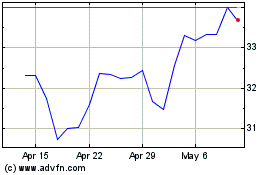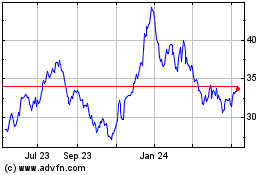UPDATE: Google's Motorola Purchase Borrows From Apple Strategy
August 15 2011 - 7:26PM
Dow Jones News
Google Inc.'s (GOOG) proposed $12.5 billion purchase of Motorola
Mobility Holdings Inc. (MMI) underscores the allure of a business
model pioneered by one of the company's rivals: Apple Inc.
(AAPL).
On Monday, Google said it was buying the Libertyville, Ill.,
handset-and-tablet maker for its portfolio of roughly 24,000
patents. Those patents would give the search giant protection of
its intellectual property in an increasingly litigious technology
environment.
The move also gives the Mountain View, Calif., Internet company
an opportunity to build handsets and tablets from the ground up
with its popular Android operating system. That would mimic Apple's
success in integrating hardware and software, a strategy that has
also inspired other companies, including Hewlett-Packard Co. (HPQ)
and Research In Motion Ltd. (RIMM, RIM.T).
The growing desire to build integrated hardware and software
highlights the success Apple has had with its tightly controlled
iPhone and iPad platforms. Apple created the smartphone market with
its iPhone, which was widely praised for its ease of use and
functionality. And Apple's iPad dominates the market for
touchscreen tablet computers despite a host of challengers.
"Vertical integration is clearly the business model of the day,"
Gartner Inc. (IT) analyst Van Baker said.
A Google spokeswoman directed reporters to comments Chief
Executive Larry Page made earlier in the day during a press
conference explaining the deal. During the call, Page said Android
would remain an open-source platform available to all of the
company's hardware partners.
"We look forward to continuing our work with all of them on an
equal basis," Page said.
H-P declined to comment. Apple and RIM did not immediately
respond to requests for comment.
Google will also benefit from Motorola's already existing
Android products. Motorola has been building Android phones for two
years, releasing the popular "Droid" phone in 2009 to much fanfare
in the U.S. Motorola has since expanded its lineup of Android
phones to include low-priced models.
Motorola has also tweaked Google's Android software, creating
its own software called "Motoblur," which is designed to help
customers connect with social networks, like Facebook Inc., more
effectively. It also launched its "Atrix" phone earlier this year,
a specialized device that docks with a keyboard and monitor to
double as a laptop computer.
Of course, marrying hardware and software is not easy. Apple has
pursued the strategy since it was founded in 1976, giving it 35
years to refine the model. Challengers are already finding it
difficult to replicate that success quickly.
For example, H-P slashed the price of its TouchPad tablet, which
uses an operating system the company purchased last year, after
reviewers complained about both the hardware and software.
RIM's first tablet, the PlayBook, has also fared poorly in the
market. Critics have complained that its QNX operating system,
which RIM also purchased last year, was not ready for prime
time.
"At the end of the day, it'll be difficult to compete against
the design team in Cupertino," said Gleacher & Co. analyst
Brian Marshall, referring to the California city in which Apple is
headquartered.
Still, Google has shown it is willing to try. Google has
released new versions of Android at a rapid pace, adding new
features that either match or surpass Apple's functionality. The
latest iteration, called "Ice Cream Sandwich," marries Android's
tablet and smartphone software, giving Google an opportunity to
refine features that have become successful on each platform.
-By Ian Sherr, Dow Jones Newswires; 415-439-6455;
ian.sherr@dowjones.com
--John Letzing contributed to this article.
Marcus and Millichap (NYSE:MMI)
Historical Stock Chart
From Aug 2024 to Sep 2024

Marcus and Millichap (NYSE:MMI)
Historical Stock Chart
From Sep 2023 to Sep 2024
